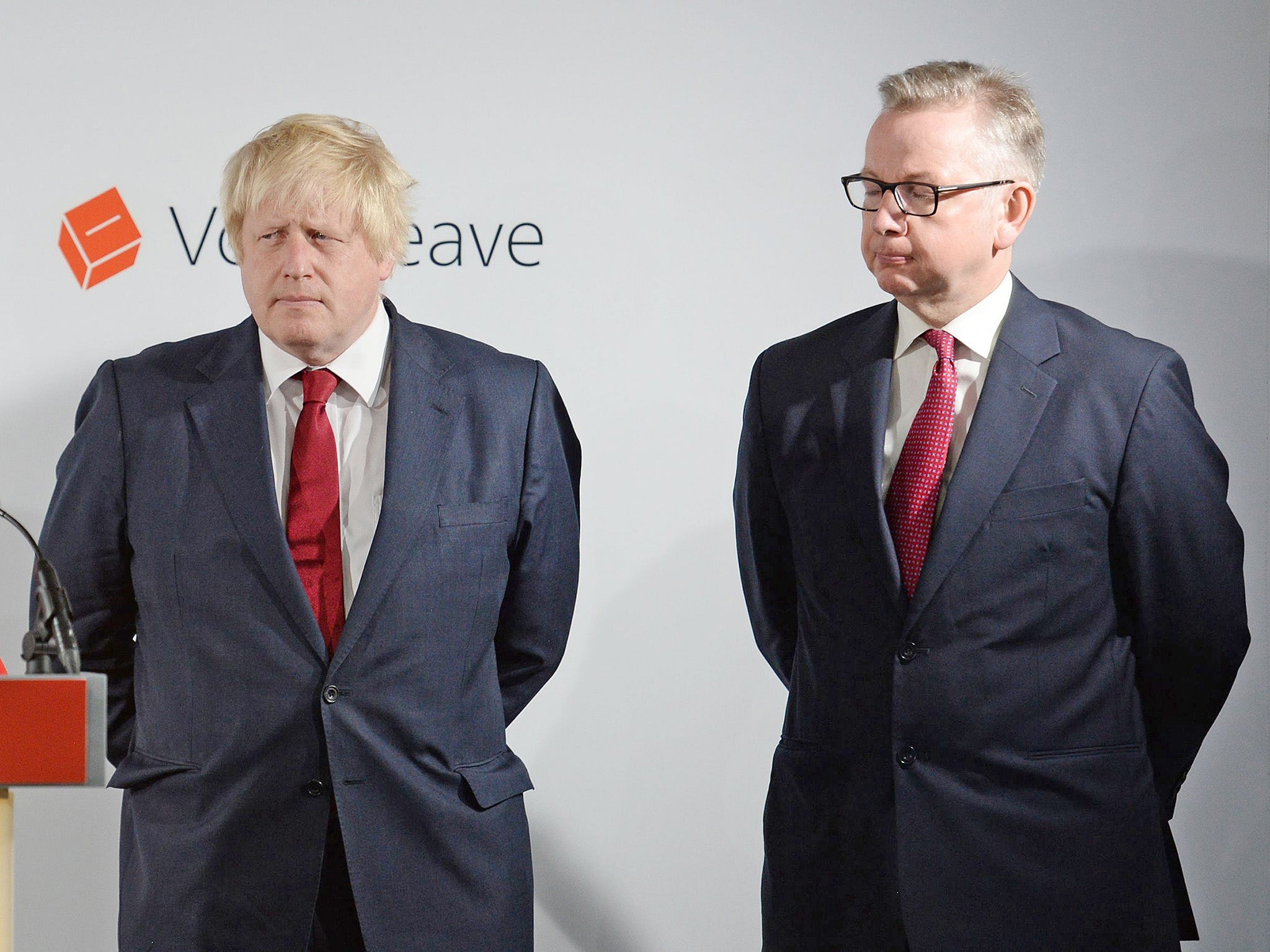Your support helps us to tell the story
From reproductive rights to climate change to Big Tech, The Independent is on the ground when the story is developing. Whether it's investigating the financials of Elon Musk's pro-Trump PAC or producing our latest documentary, 'The A Word', which shines a light on the American women fighting for reproductive rights, we know how important it is to parse out the facts from the messaging.
At such a critical moment in US history, we need reporters on the ground. Your donation allows us to keep sending journalists to speak to both sides of the story.
The Independent is trusted by Americans across the entire political spectrum. And unlike many other quality news outlets, we choose not to lock Americans out of our reporting and analysis with paywalls. We believe quality journalism should be available to everyone, paid for by those who can afford it.
Your support makes all the difference.Michael Gove has said the British people could have their say on a Brexit deal with the EU via a general election.
Writing in the Daily Telegraph, Mr Gove said: “The British people will be in control. If the British people dislike the agreement that we have negotiated with the EU, the agreement will allow a future government to diverge.”
The Environment Secretary and leading Brexiteer reiterated the UK’s position on the negotiations that “nothing is agreed until everything is agreed” at the end of the process.
“By the time of the next election, EU law and any new treaty with the EU will cease to have primacy or direct effect in UK law,” said Mr Gove, which means the UK could change or reject its agreements with Brussels.
After a transition period, the UK would have “full freedom to diverge from EU law on the single market and customs union.”
But the latest a general election could occur would be June 2022, which would be three years after the UK’s exit from the European Union.
Liberal Democrat leader Sir Vince Cable said Mr Gove was simply trying to deny the electorate the chance for a meaningful say on the terms of withdrawal, which can only happen before the UK leaves.
Sir Vince said: “Michael Gove is trying to do the opposite of what he says: he wants to strip the British people of control of this process.
“As recent polling has shown, there is a growing consensus supporting the Liberal Democrat policy for the public to have a vote on the terms of the deal, but extreme Brexiters do not want to take this risk in the light of increasing economic and political evidence that Brexit will be seriously damaging to the UK.
“Gove wants to deny us the right to block a poor deal. If, by the time of a 2022 general election, the government has negotiated and implemented a bad deal, we would not have the option of returning to the EU on the terms we currently enjoy with our closest, biggest and most important trading partner.
“The only way to give people control is for a vote on the terms of the deal, with the option of an Exit from Brexit.”
On Friday the Prime Minister flew to Brussels, to announce the EU and the UK had reached an agreement on phase one of the negotiations and will now progress to talks on trade. The broad outline of any future deal, or transitional phase is expected to need agreement by October of next year.
The UK will pay a “divorce settlement” of between £35 and £39 billion, although EU figures have suggested no firm figure has been agreed. The wording of the agreement says there will be “full alignment” in regulations between Northern Ireland and the Republic in certain sectors to allow for an open border to be maintained.
It will also involve the European Court of Justice overseeing the rights of EU nationals living in the UK for the next eight years.
The Cabinet will meet on 19 December and discuss, for the first time, what future trading relationship the UK should seek with the EU.
Former Ukip leader Nigel Farage said certain Brexiteers would not be happy with the arrangements.
He told the BBC: “I think that within the next 48 hours you will hear a lot more Conservative voices... saying, actually, they are not happy with what’s happened today.”
Some Conservatives have already expressed concern over the role of the European Court of Justice’s continuing jurisdiction over the UK for such a lengthy period.
Leave campaigner Andrea Leadsom, leader of the Commons, said the overall deal was a “significant achievement” for the Prime Minister.
“People on all sides of the argument are now seeing that she is determined and is succeeding in making a success of leaving the EU,” she said.
Justice Minister Dominic Raab also said the details on how to deal with the issue of the Irish border had still to be worked out in full.
He told BBC 2’s Newsnight: “You can call it strategic ambiguity, you can call it constructive ambiguity... what I am admitting to you, very openly, and honestly, is that we have agreed principles, but that the details still need to be ironed out on this very bespoke set of issues around Northern Ireland which can’t be dealt with properly and responsibly outside of the context of the broader negotiation on customs and trade and all of those other things we have said all along.”

Join our commenting forum
Join thought-provoking conversations, follow other Independent readers and see their replies
Comments